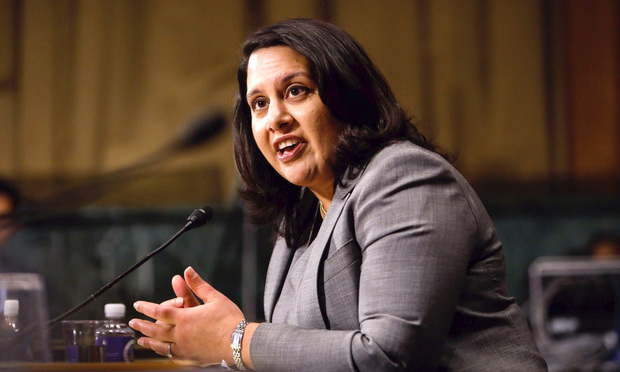Federal Judge Hits Trump Agency for 'Illegal' Move to Stop New Pay-Data Rule
U.S. District Judge Tanya Chutkan's ruling Monday was the latest blow to the Trump administration's maneuvering to block Obama-era rules.
March 04, 2019 at 08:48 PM
4 minute read
 Neomi Rao testifies before the Senate Judiciary Committee during her confirmation hearing to be U.S. Circuit Judge for the District of Columbia Circuit. (Photo: Diego M. Radzinschi / ALM)
Neomi Rao testifies before the Senate Judiciary Committee during her confirmation hearing to be U.S. Circuit Judge for the District of Columbia Circuit. (Photo: Diego M. Radzinschi / ALM)
The Trump administration's move to stop an Obama-era regulation aimed at pay transparency was unlawful, and the rule requiring that employers disclose more workforce data should be reinstated, a Washington federal judge said Monday.
Judge Tanya Chutkan of the U.S. District Court for the District of Columbia said the Office of Management and Budget did not provide sufficient justification before blocking the enforcement of the Obama-era regulation, which would have expanded the scope of information that employers are required to reveal every year to the U.S. Equal Employment Opportunity Commission.
The National Women's Law Center and the Labor Council for Latin American Advancement sued the Office of Management and Budget in November 2017 after the agency put the new pay-data rule on hold. The expanded EEO-1 report would have gone into effect by the annual filing deadline in March 2018. The measure required companies to disclose pay information based on gender, race and ethnicity.
“This is vindication for those who believe pay data is key to equal pay enforcement,” Emily Martin, who oversees advocacy for the National Women's Law Center, said Monday. “It makes clear that the Trump administration's efforts to block that critical initiative were lawless.”
The EEOC recently extended the EEO-1 reporting deadline until May 31. It was not immediately known whether the Trump administration would seek to appeal Chutkan's ruling. The OMB and EEOC did not immediately respond to request for comment.
The lawsuit was filed against the OMB and the EEOC and named Mick Mulvaney, Neomi Rao and EEOC chairwoman Victoria Lipnic as defendants. Rao, head of the Office of Information and Regulatory Affairs, is awaiting a confirmation vote to a seat on the U.S. Court of Appeals for the D.C. Circuit is pending.
The new requirements were unpopular with the business advocates, who claimed implementation of the new rules would lead to administrative hassles and unfairly expose companies to liability based on allegedly misinterpreted data.
Workers' advocates argued the Trump administration did not have the right to rollback the regulation, which effectively stopped a six-year regulatory process that resulted in the new pay-data reporting rule. They plaintiffs alleged the government and the budget office buckled to pressure from business interests.
Chutkan said that the Trump administration did not take the proper steps to stay the regulation and found the conclusions, “arbitrary, capricious, an abuse of discretion, or otherwise not in accordance with law.”
The judge said OMB's “deficiencies were substantial, and the court finds it unlikely that the government could justify its decision on remand.” Chutkan said OMB “also failed to demonstrate good cause for the stay.”
“The government's deficiency is not that it failed to explain OMB's 'reasoning,' but that OMB's reasoning lacked support in the record,” Chutkan wrote in her ruling.
Read the ruling in National Women's Law Center v. OMB:
Read more:
Neomi Rao's DC Circuit Nomination Clears Senate Panel
DC Circuit Pick Neomi Rao Expresses Regret for Past Writings on Sexual Assault
Advocacy Groups Press White House for Answers on Pay Data Disclosure Changes
Pay Equity Disputes Are Flourishing, and Expect More in the New Year
This content has been archived. It is available through our partners, LexisNexis® and Bloomberg Law.
To view this content, please continue to their sites.
Not a Lexis Subscriber?
Subscribe Now
Not a Bloomberg Law Subscriber?
Subscribe Now
NOT FOR REPRINT
© 2025 ALM Global, LLC, All Rights Reserved. Request academic re-use from www.copyright.com. All other uses, submit a request to [email protected]. For more information visit Asset & Logo Licensing.
You Might Like
View All
Skadden and Steptoe, Defending Amex GBT, Blasts Biden DOJ's Antitrust Lawsuit Over Merger Proposal
4 minute read
'Lack of Independence' or 'Tethered to the Law'? Witnesses Speak on Bondi
4 minute read
Trending Stories
Who Got The Work
J. Brugh Lower of Gibbons has entered an appearance for industrial equipment supplier Devco Corporation in a pending trademark infringement lawsuit. The suit, accusing the defendant of selling knock-off Graco products, was filed Dec. 18 in New Jersey District Court by Rivkin Radler on behalf of Graco Inc. and Graco Minnesota. The case, assigned to U.S. District Judge Zahid N. Quraishi, is 3:24-cv-11294, Graco Inc. et al v. Devco Corporation.
Who Got The Work
Rebecca Maller-Stein and Kent A. Yalowitz of Arnold & Porter Kaye Scholer have entered their appearances for Hanaco Venture Capital and its executives, Lior Prosor and David Frankel, in a pending securities lawsuit. The action, filed on Dec. 24 in New York Southern District Court by Zell, Aron & Co. on behalf of Goldeneye Advisors, accuses the defendants of negligently and fraudulently managing the plaintiff's $1 million investment. The case, assigned to U.S. District Judge Vernon S. Broderick, is 1:24-cv-09918, Goldeneye Advisors, LLC v. Hanaco Venture Capital, Ltd. et al.
Who Got The Work
Attorneys from A&O Shearman has stepped in as defense counsel for Toronto-Dominion Bank and other defendants in a pending securities class action. The suit, filed Dec. 11 in New York Southern District Court by Bleichmar Fonti & Auld, accuses the defendants of concealing the bank's 'pervasive' deficiencies in regards to its compliance with the Bank Secrecy Act and the quality of its anti-money laundering controls. The case, assigned to U.S. District Judge Arun Subramanian, is 1:24-cv-09445, Gonzalez v. The Toronto-Dominion Bank et al.
Who Got The Work
Crown Castle International, a Pennsylvania company providing shared communications infrastructure, has turned to Luke D. Wolf of Gordon Rees Scully Mansukhani to fend off a pending breach-of-contract lawsuit. The court action, filed Nov. 25 in Michigan Eastern District Court by Hooper Hathaway PC on behalf of The Town Residences LLC, accuses Crown Castle of failing to transfer approximately $30,000 in utility payments from T-Mobile in breach of a roof-top lease and assignment agreement. The case, assigned to U.S. District Judge Susan K. Declercq, is 2:24-cv-13131, The Town Residences LLC v. T-Mobile US, Inc. et al.
Who Got The Work
Wilfred P. Coronato and Daniel M. Schwartz of McCarter & English have stepped in as defense counsel to Electrolux Home Products Inc. in a pending product liability lawsuit. The court action, filed Nov. 26 in New York Eastern District Court by Poulos Lopiccolo PC and Nagel Rice LLP on behalf of David Stern, alleges that the defendant's refrigerators’ drawers and shelving repeatedly break and fall apart within months after purchase. The case, assigned to U.S. District Judge Joan M. Azrack, is 2:24-cv-08204, Stern v. Electrolux Home Products, Inc.
Featured Firms
Law Offices of Gary Martin Hays & Associates, P.C.
(470) 294-1674
Law Offices of Mark E. Salomone
(857) 444-6468
Smith & Hassler
(713) 739-1250











